- Memories of Nicholas Schaffner and The Beatles Forever - January 4, 2026
- Old Draft: Beatles Folk Memory 1970-1995 - December 8, 2025
- Lights are back on. - December 8, 2025
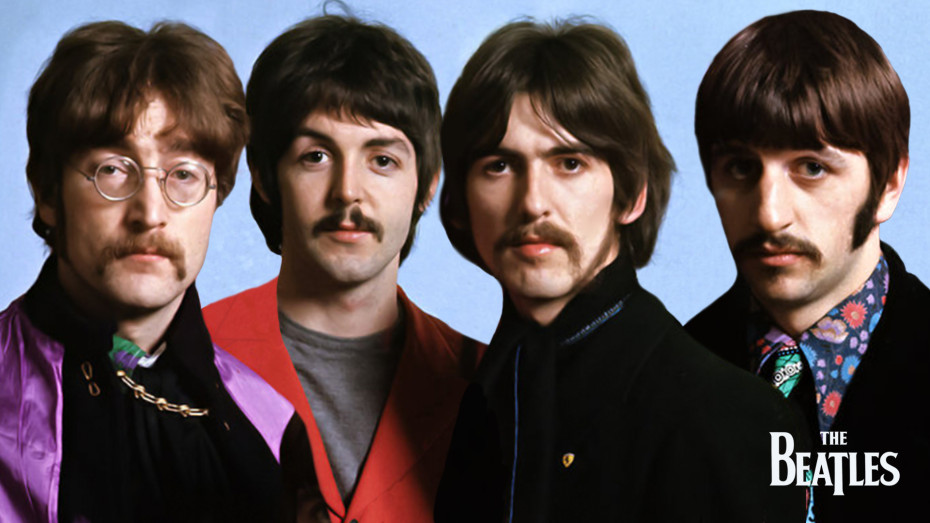
“We make it up in volume.”
Finally! A band that can live on 0.006 per song!
As you might have heard, the Beatles’ catalog became available for streaming on December 24th, and users took to it with a will, streaming 70 million Beatles songs in the first three days. Commenter @Hologram Sam posted the following lists of the ten most — and least — popular Beatles tracks on Spotify. They puzzled and enchanted me, and so I decided to write the single most internetty piece in the history of Hey Dullblog. And in the spirit of the internet, my goal was to do it with no editing.
OK, GO!
MOST POPULAR
10. “Help!” — Emo Beatles. Beloved of sensitive types everywhere, this is basically applicable to everyone’s life from about 12 to 21.
9. “She Loves You” — …but she apparently loves this song more. A lot more.
8. “In My Life” — Can I say something cynical here? I bet this song just wasn’t very popular before John Lennon died and made it all tragi-riffic. I don’t look to the Beatles for pathos, but if you do, there’s a whole album called “Double Fantasy” that you will love. Or “Grow Old Along With Me,” if you’re married that’ll fuck you up for days.
7. “I Want To Hold Your Hand” — Fucking great.
6. “Blackbird” — Amazing.
5. “Twist And Shout” — Recorded in one take, and for my money the best pure rock vocal ever, which makes up for the fact that for at least a generation it was known as “that song from ‘Ferris Bueller.'”
4. “Let It Be” — See #8. When Paul dies, this will shoot to #1 so hard that Spotify will MELT.
3. “Here Comes The Sun” — Everybody’s favorite George song. And, like all Beatles #1’s, a punny newspaper headline waiting to happen.
2. “Hey Jude” — WHAT? Not #1? What in classic rock is going on here? Don’t Spotify listeners realize that all lists of Beatles songs must top out with “Hey Jude,” except for the ones that end with “Yesterday”? And the ones Rolling Stone does, which must award the crown to either “A Day in the Life,” or “Strawberry Fields”? This next one better be good…
1. “Come Together” — Okay, what? Great song, especially thanks to the rhythm section, but…does it sound fucking awesome when you’re high and wearing earbuds? Commenters, speak to me.
LEAST POPULAR
10. “Honey Don’t” — Oh what the hell? Can’t we give Ringo a break? It’s Christmas.
9. “Thank You Girl” — An early B-side, so OK. Shows people don’t really appreciate the deep tracks, but whatever.
8. “I’ll Get You” — See #9.
7. “Long Tall Sally” — This is preposterous. Paul was bringing the house down for ten years with this one. Web users have no souls. Go stream “Blurred Lines,” assholes.
6. “I Call Your Name” — OK, now I’m really getting pissed. This is probably in my top five favorite Beatles songs. I think @Sam is actually trying to troll me.
5. “The Inner Light” — This makes perfect sense, until you realize that 17.5% of the total world population lives in India. That’s not enough to keep “The Inner Light” out of the cellar? Indian Beatle fans, you are just not pulling your weight. George believed in you, now you believe in him!
4. “Slow Down” — See #7. People just have shitty taste in music, is all.
3. “Bad Boy” — Pro Tip: if you want to do well on Spotify, don’t cover Larry Williams. In fact, if you stream an actual Larry Williams song, Spotify will self-destruct.
2. “Matchbox” — Ditto Carl Perkins.
1. “Her Majesty” — Oh, unfair. Where’s “Sgt Pepper’s Inner Groove”?
All I can say is: finally, a little respect for “Mr. Moonlight.”

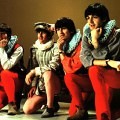
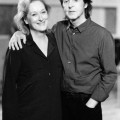
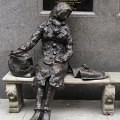
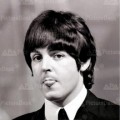
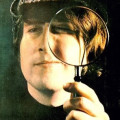
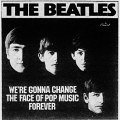
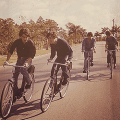
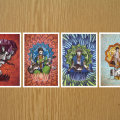

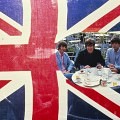
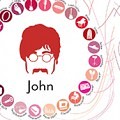
What amazed me was the lack of love for the psychedelia. Nothing from Pepper or Revolver or MMT in the top ten? And seeing “I’ll Get You” in the bottom ten saddened me. I get a thrill when I hear the harmonies in “Well there’s gonna be a time, when I’m gonna change your mind, so you might as well resign yourself to meeeee, oh yea” (If you want to experience that thrill all over again, go on youtube and listen to Paul sing it with his current touring combo).
.
I really thought, with marijuana being so much more potent nowadays, and the variety of delivery methods (edibles, vaporizing, bongs shaped like MBE’s) that some psychedelic BeatleSongs would have made the top ten. Because the trippy stuff never really went away.
For example, I was listening to the artist named “xxyyxx” (his song “About You”) and the whole thing is constructed around a backward recording of a young woman singing one line. Something Revolver-era Lennon would have created in his sleep.
Most of their duds were cover songs and they did make some bad choices. Several covers they played for the Beeb were better than some of the ones they put on albums (including – sorry, George – all the Carl Perkins they covered), but “Long Tall Sally” is one of Macca’s best vocal performances ever and John tore up Larry Williams. Zero logic for those placing behind “Kansas City/Hey-Hey-Hey-Hey” or “Chains”.
As for “Come Together”, I can’t recall the last time I heard a classic rock station playing anything prior to Abbey Road in regular rotation. As long as Boston keeps moving product despite a song per hour from the same album being played on every rock station, unenlightened Millenniums will stream “Come Together” as much as anything else in the catalog because that’s what they know.
Yeah, Chuck, I’m amazed (and this dovetails with Sam’s comment, too) at how the Beatles begin and end with Abbey Road on classic rock stations — it’s “Hey Jude,” and Abbey Road. Revolver and after will get played on “oldies” stations… but explain to me how, say, Strawberry Fields or Penny Lane doesn’t feel as fresh as oh, for example, Modest Mouse or Fountains of Wayne or OK Go — not to mention all the Beatle-influenced new wave bands like XTC or Squeeze or The Jam. Is it just the texture of the recordings that people think “old” and dismiss? What do you think? How is “Yesterday” not simply a great radio listen, EVEN after all these years, regardless of format?
In a related point, this is also what makes the McCartney hatred within the classic rock mindset so infuriating to me. The ONE Beatles album that still sounds fresh enough to play is almost entirely a product of Paul McCartney. “Come Together” would’ve been nothing — nothing — if it had remained a Chuck Berry ripoff it was when Lennon brought it into the studio. It’s the bassline and the drums that give the song its wonderful tension. Abbey Road is like Pepper two years later in how it’s a perfect expression of Paul’s studio obsessiveness and commitment to pop excellence. But if you talk to any of the listeners of classic rock, Paul is dismissed as a total lightweight. Bottom line is, Paul just isn’t “aarrrgh! Rock n roll! aarrrgh!” for them. Stupidness.
Michael, you forgot to mention the brilliant swamp piano Paul composed for the song… and my hunch is that you guys are falling in the John vs Paul trap, that stupid media wankers, lead by super-wanker Wenner, created by promoting the idea John was the super-creator…
To me ‘Come Together’ appears as one of those grand Beatles studio performances they created as a band, not one or the other…
“one of those grand Beatles studio performances they created as a band, not one or the other…”
Yeah, @Rob. Better.
I have Spotify. People have said the reason Come Together is first is the best of the Beatles playlist is called Come Together, that song is first on that playlist. People who don’t know the Beatles very well pick that playlist. So Come Together gets the vote.
What would Rolling Stone have said about McCartney had he been assassinated in 1980? Would that nincompoop Jan Wenner have left off sucking Lennon’s dick long enough to honor one of the greatest pure musicians of all time? Rock critics are like film critics — they want to signal their machismo so much that for them “gritty realism” is the only metric of art and authenticity. Thus, gangster bands (except for Zeppelin, still too English) and gangster movies slouch all over the top 10 lists.
— The story is told that some famous producer or composer was asked who he thought to be the greatest modern arranger, and he replied “Wings.” It surprises me that McCartney never tried to produce other acts. “Come Together” is the perfect example of what he brought to the Beatles and to John Lennon himself. Lennon comes in with a vanilla Chuck Berry rocker. McCartney slows it way down, swamps it up, plays the signature bass lick, teaches Ringo the fantastic fills to use, and basically, from shit, extracts pure Shinola. I’m hyperbolizing — Lennon’s lyrics are magnificent — but you get the idea.
— The White Album bootlegs of (I think) I Will show McCartney, every time he messes up (this simple song took over 60 takes), diverting into some little squib of a song, like the “Brother Can You Take Me Back” fragment before “Revolution 9.” Donovan said that if you dropped McCartney onto a piano, by the time he picked himself up he’d have written three songs. It was simply a faucet serving an inexhausible supply.
— I think the McCartney/Lennon competition repeats the received wisdom of the Mozart/Beethoven dichotomy. Music simply flowed from Mozart, effortlessly. Combined with the hard work he put it, his music sounds so simple, so effortless, so easy to do, anybody could do it (until they try). Compare Beethoven — an equally great composer, for some reason he gets additional points for being tormented by composition, for having composition come difficult to him, for his excruciating birthing process.
— As I said, music critics are little boys — they want to identify with “real men”, and they can’t be seen liking compulsive songbirds over tormented artists — whether the torment arose from the struggle for musical greatness, or merely a boy-man’s tormented pleading for validation from a manipulative Japanese ersatz mommy.
High-Five to Sir Fuddleston for this post!
Dear Sir Huddleston
Hey Hey Hey, Slow Down, come together, and sleep tight… that old Mozart and Beethoven stuff si a bit outdated, I/you/we should have known better, of course the myth confused a lot of people with limited brain power or interest in music history…
Composition did come easy for Mozart all the time, he really worked his ass off, the ability to do that makes geniuses of ten genius, pus charism and good or lucky pr stuff…
For an interesting read try Alex Ross from the New Yorker from way back when in 2006.
Good day, Sir.
Oops I forgot to ad the link to Alex Ross article on the hard work Mozart did on his composition and the common belief of his child like inspiration, that came without any effort.
http://www.newyorker.com/magazine/2006/07/24/the-storm-of-style?mbid=nl_Sunday%20Longreads%20(22)&CNDID=39098105&spMailingID=8395554&spUserID=MTEyMDk0NzU5MTgwS0&spJobID=840264181&spReportId=ODQwMjY0MTgxS0
My brother listened to Spotify when the Beatles dropped, and he said he could hear what Geoff Emerick was talking about — that Abbey Road sounded worse than the previous albums, because of the transistorized board they used, instead of the old tube rigs. I’m inclined to believe it, except that I’m becoming biased and nostalgic — I discovered the Beatles in the mid 70’s, early 80’s, and by the time Compact Disc came out I had a monster collection of Beatles on vinyl: low-numbered German release White Album, White disc White Albums, Japanese red vinyl Sgt. Peppers, Revolver, Rubber Soul, and many others. But like an idiot I sold them all and moved to CD, which I then discovered were mastered like ASS.
— So when they released the Beatles in Mono on vinyl, FINALLY remastered with meticulous care by real professionals in 2009 (why was the world’s greatest band so horribly mastered?), I bought it, a decent turntable, and a tube amp. The sound is so good it makes me giddy to think that I lived to hear it. I even spent beaucoup $$ on the famous Yellow Submarine “Songtrack” album, which has fascinating remasters of the great post Pepper collection.
— So it’s a strange confluence — first rate vinyl releases, the closest the Beatles have ever sounded to the original mix, in tandem with compressed low quality mp3s. The only conclusion I’m able to make is not matter what Apple puts out, I will apparently spend money on it. How about a poll — how do you Dullbloggers get your audio?
I agree that on the top 10 list there seems to be a vast gulf between early stuff and late stuff. Anecdotally, this is also confirmed by what I tend to see younger people favoring (based on their comments)–they gravitate towards the White Album through Abbey Road period.
.
One possible explanation is that The Beatles’ middle period is the most dated–I don’t mean that in a pejorative sense, but some things are simply inextricably associated with their time. Glenn Miller music can be awesome, but there is no way of disassociating it from its era. You have to make the conscious decision “I feel like some ’40s music”.
.
I would argue that most of the songs on that list come close to being “timeless”, in the sense that a person (particularly a younger person) might not automatically think “sixties” when hearing them. Even “Twist and Shout” is close enough to pure rock n’ roll to exist outside of time. When I think of the Rubber Soul-Pepper period, I think mostly of music that could only have come from a particular time and place, even if it’s bloody brilliant.
I think you’re right about this, @Beasty. We must remember how brief the psychedelic era was — I’d date it no earlier than ’65 (Michael Hollingshead, Mr. Tambourine Man?) and probably ended in April ’68, or June. Certainly it was dead by the Days of Rage.
Part of what makes psychedelia so gripping even now is how tied it was to its time; I’ve talked endlessly here about how that is what makes Sgt. Pepper the Beatles’ highpoint in my opinion — not just great music (Revolver, parts of White, Abbey Road are all great music), but Pepper combines a Beatlemania-scale international event with music and packaging and outlook fundamentally more ambitious. Pepper was a worldwide cultural event, and it was simultaneous. There’s never been anything like it in rock before or since.
The Beatles’ middle period is, to me, their highpoint. But appreciating it requires a kind of temporal humility, and an historical imagination, that fewer and fewer people have. Abbey Road requires no such effort, which is its genius.
But it is the merest taste of what the Beatles were and mean and can offer patient listeners. So: we do the blog.
Sgt. Pepper is my favorite Beatles album, so I too am confused by its lack of popularity. Although… it’s probably not fair to call it unpopular. Popularity is relative, right? 🙂 We’re talking about the Beatles here. So tracks number 75-100 on this list are still wildly popular in the grand scheme of things.
No singles, maybe?
Kids aren’t doing as much acid these days?
Actually just as much now as in the 60s, according to this article.
The reference to the sixties is quite silly, the question were focussing on lifetime usage… Dutch numbers, for what they are worth, shows that the peak of drugs use was in the late seventies/early eighties, not the sixties, and not even the seventies.
.
“Come Together” is the perfect example of what he brought to the Beatles and to John Lennon himself. Lennon comes in with a vanilla Chuck Berry rocker. McCartney slows it way down, swamps it up, plays the signature bass lick, teaches Ringo the fantastic fills to use, and basically, from shit, extracts pure Shinola.
.
But how many listeners actually know that? I didn’t know until I read it in this blog, and I’m what doctors call a Beatles Obsessive. Most casual listeners hear John’s voice and think “A Lennon Creation” (Come Together, Strawberry Fields, etc.) and hear Paul’s voice and think “A McCartney Creation” (Maxwell’s Silver Hammer, Your Mother Should Know). The invisible Paul, the guy who made all the arrangement decisions on John’s songs, goes uncredited.
.
How about a poll — how do you Dullbloggers get your audio?
.
I’m ashamed to admit I get my audio from headphones, macbook pro laptop and youtube. I spent my teen years running out and buying every vinyl release, I spent my middle years running out and buying every CD. Now I feel old, I have what a young ENT doc called “profound hearing loss” and I’m tired.
.
I don’t have a turntable or my big marantz speakers anymore; they’re long gone. I still have a CD player, but it’s a tiny little thing. I don’t use spotify or any of the other download services. So I suppose I’m out of the game.
You Tube and (when it doesn’t goddamn eat my music) the execrable iTunes. Opera on the weekends goes through the speakers; ditto jazz during dinner. I have a turntable to play my old comedy LPs (quite a collection of those, see my comment to @Sir Huddleston re: comedy records), but the Beatles are a headphones experience for me. Maybe that’s why I like the psychedelic era so much.
I want to put a vote in for “You Can’t Do That”–one of my favourite John songs where I can’t believe he didn’t know what an awesome voice he had. Also–where’s AHDN? Tons of great songs there.
Can I leap to the defence of John on Come Together here?
1. Yes, the melody of the first part of the verses is a slowed-down ‘You Can’t Catch Me’ but not the second part, or the chorus.
2. The most arresting part of the song is the lyrics, 100% John’s.
3. The second best part is the ‘shoot me’ bit, also John’s.
4. I’m pretty sure John knew what he wanted it to sound like.
I’ll buy it up until the last one, @Dan. As you probably know, it started out as a campaign song for Timothy Leary. I suspect that there was a great big gap between the song as John initially heard it and the eventual recording.
Given what John produced after the Beatles, and what we know about songs like “Strawberry Fields” and “Tomorrow Never Knows,” it seems likely that John gave general instructions, and then said yes/no to ideas that Paul and George Martin presented.
In fact it’s pretty striking how solo Lennon really doesn’t have a distinctive sound after POB. It’s very “what’s popular now.”
I would like to offer a general “AMEN” to I Call Your Name, I’ll Get You and Thank You Girl, all of which are fully terrific. The rest of those covers are OK, but they really do have a few stink-bombs. I had never heard the original Anna until maybe 10 or 15 years ago, and when I did? Man, I was so ashamed of the Beatles. I mean…. GOD, they butchered that song BAD. REAL BAD. Like, they Pat Booned that shit.
I think they generally do OK on their girl-group covers and their Chuck Berry and LR ones. Money is not totally cringe-worthy. But Twist and Shout? I know I’m going to have to duck grenades when I say this, but I don’t care for it. The original is just so much better, and the Beatles version is so tight and white. As a record it’s enjoyable and a great performance… but I can’t help but have a thumbs-down reaction. Ugh. I hate to be that annoying person and I completely understand the context of the era, but… Just No.
.
Also, how is Revolution 9 not in the bottom ten? WTF? And… are things like What a Shame Mary Jane included in Beatles Spotify? How about That Means a Lot or How Do You Do It? There are some tracks that most of us have always considered part of the Beatles catalog but I have no idea if they are part of the “official” one….
I remember the first time everyone heard John’s vocal in Twist and Shout–it blew everyone’s mind. It was so ahead of it’s time.
I love replying to myself. 🙂
.
Being anal about grammar and punctuation, I typed “it’s” rather than “its.” Now I can sleep tonight.
.
And I also wanted to put the plug in for John’s vocal in “Baby it’s You”–very sexy.
To comment on your review of the Beatles’ “Twist and Shout” as “tight and white” I think that is not a bug, it’s a feature. When told by some reporter (paraphrasing) that they “didn’t really sound like a black R&B band”, McCartney replied, in effect, “that’s right, ’cause we’re four white guys from Liverpool.”
— That’s what was so great about the Beatles — they were not ashamed to be who they were. McCartney would sing “Besame Mucho” on stage, for Christ’s sake. That’s why applying Phil Spector to Let It Be and All Things Must Pass was so ruinous — it took the Beatles’ uniqueness and candy coated it with Spector’s gunpowder-scented saccharine.
— George Martin wanted the first album to sound like a live performance. And that’s what “Twist and Shout” delivered — they went balls to the wall, and one is able to feel some of the incredible energy which fans reported they felt at their live shows. Whether it’s like the original, worse, or better, is immaterial.
— By the way, that’s one of the lucky breaks the Beatles got. They really were of their place: they were an English band, and that always comes through whatever their source material. George Martin, coming from the uniquely English comic record tradition was able to respect and enhance that. Can you imagine if they’d been saddled with Mickey Most as a producer? They would have produced cardboard cutouts for two years in misery and frustration and gone the way of The Yardbirds.
To comment on your review of the Beatles’ “Twist and Shout” as “tight and white” I think that is not a bug, it’s a feature.
–
Absolutely. I get that, and it’s not really a criticism. It’s just a matter of personal taste. I like a ton of things tight and white, including (the majority of) the first two Beatles albums . 🙂 That particular track just doesn’t do it for me, personally. I understand why everyone loves it.
Oh, this is great, @Sir: “Spector’s gunpowder-scented saccharine.” Just marvelous.
“coming from the uniquely English comic record tradition”
Your point about Martin’s comic record background being perfect for the Beatles is well taken. But I wouldn’t call comic records a uniquely English tradition by any stretch. When Martin was working at Parlophone, people like Mort Sahl and Shelley Berman were selling lots of records in the States. The difference is — and I think this actually enhances your point re: Martin’s fitness to produce the Beatles — whereas American comedy was based in the nightclub forms of standup and improvisation, British comedy used the form of music hall forms of variety and written sketches.
Just as Beyond the Fringe was a direct precursor to The Beatles, the sonic environments created by The Goons were a direct precursor to Sgt. Pepper. This also shows why The Beatles’ post-India turn towards “more honest” music was such a mistake — they simply weren’t part of that tradition. They were the best studio band ever, but if the goal was sweaty one-take heat, best they could hope for was to be overearnest imitators, like the Stones.
There’s a reason why England produced a Peter Sellers, Peter Cook, and John Cleese — but never a Lenny Bruce.
@Michael, you should make a separate posting about this subject… you know the comic stuff better than anyone here… I wonder what you think of Lewisohn’s assessment of the background of both The Beatles and George Martin and its artistic/creative influence on the music, the Christmas fan-records.
@rob, if you point me to the relevant quote/passage in Lewisohn, I’d be happy to see what it joggles. To me, the Beatles are as much about comedy S they are music–just as a good humor magazine is as much about graphic art as it is about comedy. It is a. Indivisible mindset, which is why the Beatles inspired such great comedy, and sprang from such great comedy.
I do not have the Lewisohn books here with me… got to check them later this week. You gave me nice homework to do!? I will and come back to you on the subject “Lewisohn’s assessment of the ‘goons’ and humor/comic/caberet background of both The Beatles and George Martin and its artistic/creative influence on their music, including the Christmas fan-records”.
I’ve thought about this a fair amount—what if the Beatles didn’t decide they needed to get “back to basics” in 1968? I’ve come to the conclusion that it’s a tantalizing idea but also impossible. It doesn’t seem like John or Paul were interested in going beyond the Magical Mystery Tour sessions in terms of soundscapes, and to go further would’ve put them a lot closer to prog-rock/art-rock territory. Even McCartney, who dabbled in just about every pop genre, never made a whole album like that, and Abbey Road/Ram seems to be the extent to which he felt most comfortable going in that direction. John’s interest, meanwhile, was bound to wane as his interest in LSD waned (which I think it would’ve with or without Yoko; everyone was easing off acid and getting into harder drugs in London in 1968). The Beatles hated repeating themselves more than anything, and they also depended upon soaking up the most significant influences around them, and then improving upon those records. By ’68, Dylan (and Brian Wilson) (and, arguably, even the Stones, who I think came out with Jumpin’ Jack Flash before Hey Jude) were releasing records that announced that “back to basics” was the new direction. To have continued exploring the sonic cosmos, ironically, might’ve made the Beatles almost sound outdated. The only other time they were really in danger of that happening was on the Help! album, when Bringing it all Back Home and singles from the Kinks and the Who and the Beach Boys started to make the Hard Day’s Night approach to writing and recording…almost old hat.
At the same time, however, I think a project that wasn’t about “no studio bullshit” would’ve been much better for the group’s sense of identity and purpose. There are a number of times on the White Album when I think, this almost like the Beatles trying to do the Stones. The Beatles are better than that.
“There are a number of times on the White Album when I think, this almost like the Beatles trying to do the Stones. The Beatles are better than that.”
Had that thought myself, and that’s Reason #452 I don’t really like White.
—
It’s an interesting question, and while I can’t argue with your logic, I also would point out that nobody could’ve foreseen the brilliance of “I Wanna Hold Your Hand” from the Decca Tapes; nor foreseen Sgt. Pepper from the vantage point of Help! What makes “back to basics” so depressing is that it’s really the first time since 1963 that the Beatles — okay, Lennon — was content not breaking new ground, not attempting to dominate the field and force everybody else to play catch up. We knew what happened when John and Paul decided to go kick ass — ass was kicked. If past was any indicator, they would’ve done it again, and perhaps spared us a lot of bad music (some of which was their own). Because Lennon’s STILL stuck in the pointless “back to basics” thing in 1975 with “Rock and Roll.”
—
“everyone was easing off acid and getting into harder drugs in London in 1968”
This, like all drug consumption patterns in the 60s (and after), isn’t about user preference. It’s about availability. Which is about law-enforcement. Which is about allocation of resources at the governmental level.
—
All this should make one ask the question, “Why were governments in the US and UK cracking down on relatively benign hallucinogens like LSD, and allowing harder drugs to become more and more available? Who benefitted from a change from softer drugs that had unquestionably altered consciousness and galvanized political action, to harder ones that were more antisocial in effect, not to mention much scarier to middle class voters?”
—
Two words: Operation CHAOS. And the detrimental effect of heroin on Lennon and his Beatles presages the descent of the entire counterculture into increasing violence, alienation, and fragmentation… which only happened after “everyone was easing off acid and getting into harder drugs.” Why? Why? Historians never ask this obvious question! Alcohol users, even alcoholics, don’t suddenly switch from booze to heroin. But make booze impossible to find, and that’s exactly what would happen.
@Karen & Michael ~ I’ll throw in my vote for “I Call Your Name” wholeheartedly (and with cowbell accompaniment. By the way, have you seen Ringo’s performance of it, in tribute to John, on youtube (with video commentary from Ringo) upfront: https://youtu.be/zDmSADebifo It’s terrific.
…And to Hologram SAM: I’m as out of the loop technologically speaking as you: No turntable, no speakers. I have a small tuner’cassette-player/DVD player combo. And actually, I’m quite happy with that. Don’t want to go through the trauma of speakers exploding (for want of a better word), one after the other, including their replacements. Must have to do with living in an old building, with old wiring.
I am cornering the screw-up market here: Above post (Jan. 2, 12:10 pm) The comment about “I Call Your Name” rightly should have been addressed to Karen and Hologram SAM. And, as I chronically do, I neglected to close my parentheses, re the cowbell accompaniment. And then further on, I substituted an apostrophe for what was to have been a backslash after “tuner”. Maybe I’m on my way to a Guinness record.
About the top and bottom 10 lists. Of course the most egregious omission is “You Know My Name (Look up the Number)”. McCartney: “I walked into the studio and John said we were going to do a new song of his. He said it was called ‘You Know My Name’. I asked ‘what are the lyrics’. John replied ‘those are the lyrics.'” Like Tolstoy, John Lennon could get you to pay attention to anything he wrote.
— And McCartney became, at the word “go”, in a single take, a lounge lizard piano player, down to every mannerism and bad-taste doodling. And I see that, once again, I’ve returned to McCartney’s ventriloquism. I read somewhere (possibly here) that “Honey Pie” is really a remarkable song, because of how accurately it copies the conventions of that genre of tune. It’s not a pastiche — it really is the genuine article, re-created 40 years after the fact. He WAS Little Richard. He WAS Dennis O’Bell (God rest his velour soul). He WAS some tweedy dapper chap coming off a Victrola in 1919. All he needed was a guy he respected to pick the wheat from the chaff.
“All he needed was a guy he respected to pick the wheat from the chaff.”
YES. And there wasn’t even that much chaff, if Paul was in a competitive relationship with an equal. But the moment he was alone, his musical fecundity and ability to imitate/inhabit became a millstone around his neck.
For the artist, too many ideas is also a curse. A lesser one, but still.
@Michael about McCartney making music on his own… so how does that put Wings in perspective. To me McCartney doesn’t seem to be able to recreate the Wings sound very well during his concerts, it is still a distinctive sound, and I agree with Laurence Juber that core Wings were Paul, Linda and Denny Laine, and the difference is not just the in the vocals.
What I am missing in a lot of discussions of Macca way of working is an assessment and appreciation of Wings music. An entirely different sound to his solo stuff, and his Beatles-stuff. That is quite an achievement.
I agree. Wings is a distinctive sound. Paul’s talent is primarily musical, where John’s talent is in being John Lennon.
How do you get to the numbers Hologram Sam presents? I can’t find them on my Spotify.
The list of the most popular/appreciated/valued (not times listened to) songs is actually different:
1 Here Comes The Sun
2 Let it Be
3 Hey Jude
4 Come Together
5 I want to hold your hand
6 Twist and Shout
7 Blackbird
8 Yesterday
9 Help!
10 She Loves You
The popularity of Here Comes The Sun need not come as a surprise, as Abbey Road is still the best selling Beatles album, apart from the times that a new release get all the attention.
Plus , more important, when The Beatles arrived on iTunes it was actually Here Comes The Sun that sold the most, and that top position lasted for months… haven’t checked recently, though.
The explanation for the top position of Come Together appears to me speculative, did anyone check the numbers on other streaming services… if it is high there, the causal relation with the playlist is irrelevant.
@Rob, what’s the metric on “popular/appreciated/valued”? Star rating or some such? I don’t use Spotify.
“Here Comes the Sun” is one of those pieces of art that sums up and expresses a shared human experience/state of mind so clearly, it will resonate for centuries. Just a guess.
Not bad for a song dashed off in a buddy’s garden. 🙂 And it underscores the insanity of the Beatles’ post-Epstein lives — if the choice is going into Apple to attend business meetings, or “sagging off” and writing an immensely popular and beloved song, the hardest-nosed businessman is going to say, “Go play in the garden, George! We’ll hire someone to run the business! Just keep writing hits!”
@Micheal about Spotify… my hunch is Hologram Sam got the frequency of playing, the list I provided was the “popular/appreciated/valued”… on spotify you can add songs to your music… my impression is that this gives a different ranking. I have never checked spotify rules
By the way the most popular Beatles songs have been played a couple of million times and as a Band/artist they end up in de top ranking (most played) #69…
Am I right that you did not particular like ‘fourfiveseconds’ from Rihanna, Keane West and Macca? This song added in less than two week 4 millions to the already crazy 256.000.000 it had before Christmas. Just listen to the rhythm, and the little sound voice noises, it is a Macca team effort at its best. Just keep on listen to her top ten on spotify and you can hear the huge difference, fourfiveseconds has this macca touch, this rocking danceable guitar riff, that should scare the shit out of Keith Richards and Ronnie Wood. And this only forty years after he started, too bad it didn’t get to #1.
@Rob, I personally did like “fourfiveseconds.” Sometimes I try not to come down too hard in favor or against something, to leave space for discussion here.
Ru
Ihanna I don’t know, but I’ve listened to Kanye and liked it. Currently I’m on a serious Daft Punk jag, which reminds me a bit of my days at Medusa’s in Chicago. So my taste is pretty varied, but the Beatles are truly an obsession; their music, for me, is a gateway, not an endpoint.
Off topic, but here are the Beatles playing with slot cars:
https://twitter.com/History_Pics/status/681596748209504256
Michael, just wondering—have you listened to the White Album in mono much? I listened to the mono mix on a pair of good headphones today, and while it didn’t change my opinion of the record, I do have to say, it sounds more cohesive and more like the Beatles knew what they were doing. The stereo mix somehow reveals *just how* disjointed and nasty the sessions were. Odd.
I have only listened to it in mono after picking up a sweet bootleg in 2004 or so.
Tell me more, @michael–any theories as to why?
Love to read about it too @Sam, hope you guys keep it out in the open…
So, @Michael, where, theoretically, would one get such bootlegs? I’m asking for purely academic interest, of course. I know there’s many famous ones out there, but short of attending a Beatles fest (yeek), how would one track them down?
@Sir, I’ve been told that people interested in such stuff now can use torrent services (Pirate Bay, etc). I’ve never been able to figure those out, honestly. What I used to do was the usual thing: buying physical vinyl and CDs from little independent record stores. If that’s what you wanted to do, you could go to eBay.
But even that’s not totally necessary — really anything on say, Artifacts, is going to be on YouTube.
A few ideas:
1) Mono is naturally going to make things sound more cohesive, because the basic track of (some members of) the band playing together is squished there in the center, not panned all the way over to the far left side of the stereo spectrum, or whatever George Martin and Geoff Emerick decided would be OK to do for the stereo mix. When the Fabs are cutting basic tracks together, there’s a certain chemistry that naturally occurs, even if the environment is as toxic as it was during White. A mix that puts the basic track in the foreground is going to have a little more of that sparkle.
2) The Beatles historically lavished more attention on the mono mixes, and while I don’t know for sure (since mono was on the way out by 1968), I bet that held true for White, as well. They probably did the mono mixes first, and—this is all very nebulous—there’s additional energy and creativity that can come through, even in mixing decisions, when you have John and Paul and George shaping the way the track sounds the first time—not recreating it again for the stereo mix. It also means that to the extent they thought about the mix during the recording process (which they probably did by ’68; Brian Wilson was doing so by ’65), they thought about it in terms of mono. I know when they were overdubbing instruments and vocals, the music in their headphones was a mono mix. So when they were thinking of what would sound good where, it might have been in relation to the rough mono mix they heard in their headphones.
3) The stereo mix of the White Album sounds a little more modern than everything before it. But that extra space somehow highlights the way the songs were assembled, laboriously, over a long summer, fueled by what sounds like (to me) a lot more acrimony and cocaine. The mono mix doesn’t have as much space, so everything’s a little more buried and you hear the stuff the Beatles wanted you to hear—I notice the harmonies more, some tube-y guitars more, and Paul and Ringo locking in the bottom end.
I still get weird vibes, but I liked it a lot more. It didn’t sound like “The Beatles do Let it Bleed“; it sounds like the Beatles doing their arty, weird, dark version of back to basics, if that makes any sense.
Right now, The Beatles’ music is on streaming media for a little over three weeks now and what are the numbers (frequency of songs played not popularity/likes) and the songs?
1. Come together – 8,6 million
2. Love Me Do – 8,6
3. Let it Be – 7,6
4. Here Comes the Sun – 6,9
5. Yesterday – 6,3
6. Hey Jude – 6,2
7. Help! – 5,4
8. I Want To Hold Your Hand – 5,3
9. All You Need Is Love – 5,1
and a whole much within the 4 million range…